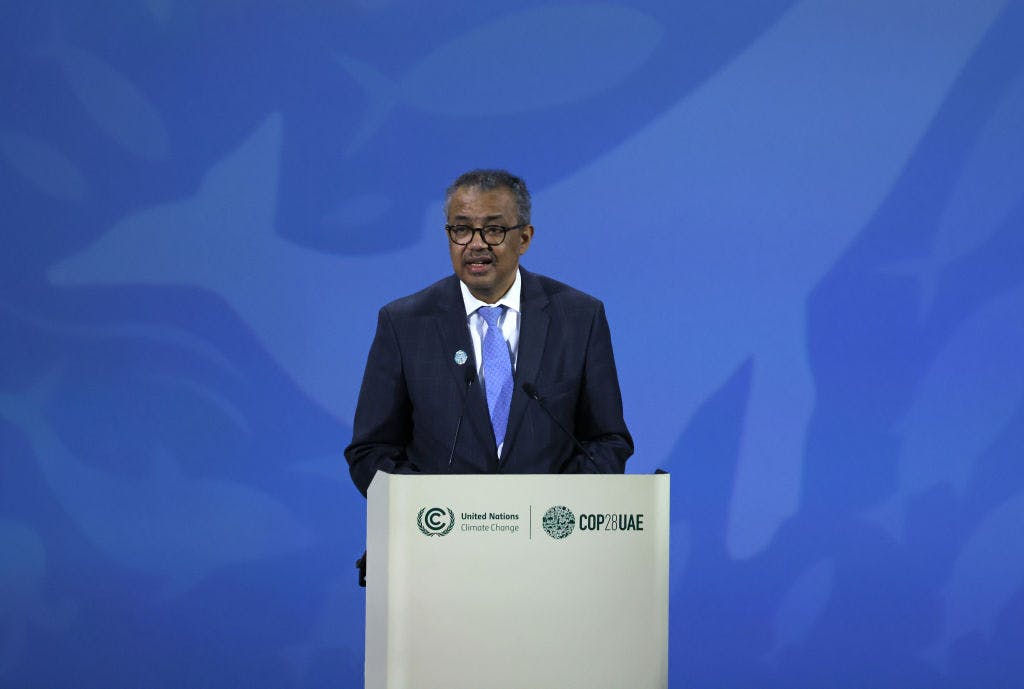The Cocktail Party Contrarian: What’s Safer — Facing Another Pandemic, Or Letting the World Health Organization ‘Save’ Us From One?
The tell that demonstrates this is a global power grab rather than an attempt to unite the world in a righteous battle for human health is the absence of any reckoning for past mistakes and abuses of power.

January 27 is the looming deadline for members of the World Health Organization to submit a final set of amendments to pandemic preparedness plans they have been working on for two years, which are slated for a vote in May.
Reports that the deadline will be missed and that the plans will be stalled are encouraging to those who have warned that the WHO’s initiative will strip participating nations of their sovereignty and trample on the civil rights of individuals. Skeptics say the WHO will move forward even if it misses the deadline, so determined is it to grab power.
Two documents constitute the set of plans under review: the pandemic plan, or “treaty,” and the amendments to the International Health Regulations. Together, they would give the WHO authority to declare a public, global health emergency, allocate financial and technological resources around the world “equitably,” mandate treatments, institute a global, digital health passport, and oversee acceptable communications about the crisis and its management.
The director general of the WHO, Tedros Adhanom Ghebreyesus, insists that the WHO’s goal is to better prepare humanity for the next Covid-like crisis and to ensure health “equity” around the world. He denies the claim that the two documents under discussion threaten governmental sovereignty or put citizens in member countries at risk of losing their freedoms.
The doctor isn’t exactly lying, but he isn’t telling the whole truth either.
Should both documents go into effect, international law would consider their terms to be “binding.” That word has impact but little legal weight internally within America and many other countries. U.S. law would not require its citizens to comply with “binding” WHO agreements (even ones its own government signed onto) unless the legislature enacts laws to that effect. Technically, America would still have sovereignty over its own health policy.
That might be reassuring, if we hadn’t just lived through Covid-19 and its aftermath, during which our officials leveraged the pandemic to assume extraordinary powers they would not have been able to assume otherwise. The Twitter and CTIL files disclosed that many in government, big tech, and the healthcare industry were happy to ignore the Bill of Rights and would be happy to do so again if given the chance. They no longer have the public’s trust, though, and would need a new source of legitimacy to ensure compliance the next time they seek to shutter churches, change election law, or censor speech.
Helpfully, the WHO’s pandemic preparedness plan provides exactly that. The WHO is creating a new bureaucratic structure, a “framework convention,” for global pandemic response plans, based on the terms of the proposed documents. Like the framework convention on climate change, it would receive funding, host annual meetings, and produce millions of pages of reports and published papers. Like the framework convention on climate change, it would project authority and put enormous pressure on “good global citizens” to adhere to its life-saving recommendations — binding or otherwise — which would be viewed, over time, as trusted orthodoxy.
Once a public health emergency is declared, the WHO could control supply chains, allocate resources and medical supplies based on “equity,” mandate medicines, collect up to 5 percent of a nation’s healthcare budget for distribution worldwide based on its assessment of need, activate digital health passports, and determine the boundaries of mis- and dis-information.
The WHO pandemic preparedness plan will serve as a menu of power-grabbing options for our authorities whose credibility deficits limit their abilities to fool the population twice. Under the guise of being “globally responsible” or respecting international law, they will cite WHO science and standards to implement the recommendations that best serve their interests — increasing mail-in ballots, deplatforming dissenting voices online, and firing noncompliant state employees, to name a few we are already familiar with.
Dr. Ghebreyesus is technically right; America would not lose its sovereignty by signing onto the WHO pandemic plans. But it might outsource it to make sure its citizens lose theirs.
The irony is that the World Health Organization would serve as anyone’s source of legitimacy. Its failures during the Covid-19 pandemic include repeating Chinese propaganda about the virus’s origins and promoting bad information about vaccines, masks, lockdowns and social distancing. The appearance of global unity and consensus goes a long way toward establishing authority, though.
The participation of representatives of 194 member states in the pandemic plans confers credibility on the WHO despite its obvious deficits, much in the same way the United Nations maintains gravitas even as it repeatedly proves itself unworthy.
The tell that demonstrates this is a global power grab rather than an attempt to unite the world in a righteous battle for human health is the absence of any reckoning for past mistakes and abuses of power in the documents. There is no interest in doing “better,” only in doing “more.”
There is vague language about giving consideration to “ensuring that the impacts of measures aimed at preventing, preparing for and responding to pandemics are proportionate to their intended objectives and that the benefits arising therefrom outweigh costs,” but no instructions to explore the specific impacts of past lockdowns on the economy, education, or mental health.
The WHO empowers itself to recommend future medical treatments for pandemics, but insists on no study of the reported harms caused by the last one. The documents do call for “a global compensation mechanism for injuries resulting from pandemic vaccines,” but don’t seek to investigate why those injuries occurred in the first place. The entire forward plan refuses to look backward.
In fact, health authorities broaden their powers in the documents. The word “pandemic” itself is redefined to allow for maximum flexibility in declaring one. International Health Regulations can be triggered not only once an emergency is declared, but when the potential for an emergency is identified by the WHO. India amended one of the drafts to remove language about respect for the dignity and human rights of individuals when emergency orders take effect.
Perhaps most concerning is that the WHO pandemic plans reach into every sector of society, giving the institution a say about almost everything. “Each Party will take steps to address the social, environmental and economic determinants of health, and vulnerability conditions that contribute to the emergence and spread of pandemics, and prevent or mitigate the socioeconomic impacts of pandemics,” the documents read, “including but not limited to, those affecting economic growth, the environment, employment, trade, transport, gender equality, education, social assistance, housing, food insecurity, nutrition and culture, and especially for persons in vulnerable situations.”
Everything relates to public health, and therefore everything is subject to the recommendations of the WHO, and a potential power grab by our own officials using the WHO as backup. This is what they mean by a “whole of society” approach to public health, and why we might be better off taking our chances with a pandemic.

